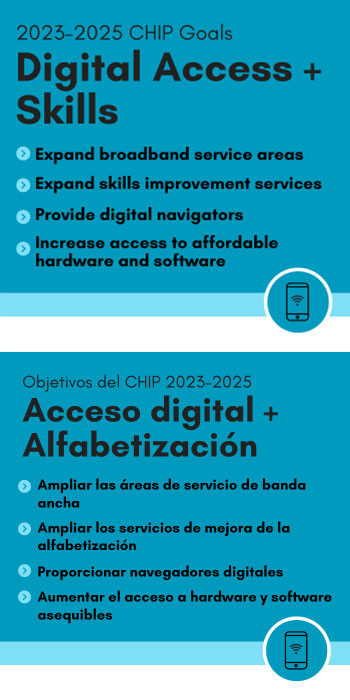Connect to care through digital access and skills

Broadband access is often referred to as a “super-determinant” of health because it plays such a critical role in connectivity to social networks, healthcare, educational institutions, and emergency services.
Yet rural localities – like Fluvanna, Greene, Louisa, and Nelson counties, plus southern Albemarle – suffer insufficient access to broadband internet.
Broadband infrastructure has been slow to reach the more remote areas of the district, and MAPP2Health participants from Nelson County in particular recognized how lack of broadband has exacerbated existing health and socioeconomic inequities – known as the digital divide.
Beyond broadband, the ability to “find, evaluate, create, and communicate information” online, known as digital skills (formerly, digital literacy), is critical to navigate the domains of daily life, including getting access to health care both in person and online.
Lack of digital skills and competencies is not confined to rural residents alone; it can be particularly challenging for older adults and non-native English speakers.
Thus, the CHIP’s goals and objectives address broadband access, literacy, hardware and software components of connectivity to navigate daily life, and specifically, healthcare encounters.
Workgroup Partners: Albemarle County Broadband Accessibility and Affordability Office, Jefferson-Madison Regional Libraries (JMRL), Jefferson Area Board for Aging Advisory Council (JABA), Louisa County Commission on Aging, Thomas Jefferson Adult Career Education (TJACE@PVCC)
CHIP Goals + Objectives | 2023-2025 CHIP Report (PDF)
| GOAL | Objective | Convener | Contributors | Target Date | Indicator | Target | Status |
| 1. Expand broadband access | 1.1 Promote the Regional Internet Service Expansion (RISE) | Firefly Fiber Broadband | Blue Ridge Health District | 12/31/2024 | # people who receive RISE marketing materials by 12/31/2024 | 50 | Digital workgroup connected to Firefly July 2023. |
| 1.2 Ensure households in need of internet get a physical connection | Firefly Fiber Broadband | Blue Ridge Health District | 12/31/2025 | % households in the District that have broadband Internet by 12/31/2025 | 90% | ||
| 2. Expand services, especially for older adults or non-native English speakers | 2.1 Increase enrollment for digital skills and learning classes | Blue Ridge Health District |
|
12/31/2025 | # non-native English speakers or people 65+ who participated in a digital skills program by 12/31/2025 | baseline + 10% | JRML awarded a grant from Public Library Association to expand digital skills workshops at all locations; July – December 2023. |
| 3. Integrate digital navigators into the healthcare domain | 3.1 Train digital navigators | Broadband Affordability and Accessibility Office (BAAO) | Blue Ridge Health District | 12/31/2024 | # digital navigators trained by 12/31/2024 | 2 | BAAO partner-funding and planning for Pilot Program for Digital Navigators and training begins October 2023. |
| 3.2 Increase paid opportunities for healthcare workers who have digital navigator training | TBD | TBD | 12/31/2024 | # paid positions for healthcare workers with digital navigator training by 12/31/2024 | 6 | Albemarle County Broadband Affordability and Accessibility Office posted positions for digital navigators, August 1, 2023. | |
| 4. Increase access to affordable hardware and software | 4.1 Develop and sustain digital access equity services at centralized locations with reliable hardware, broadband, software, and technology support | TBD |
|
12/31/2024 | # digital access equity days at JMRL locations by 12/31/2024 | 6 | Progress reports begin 2024, after Pilot Program results. |
Follow the next policy target: Mental + Behavioral Health >>
